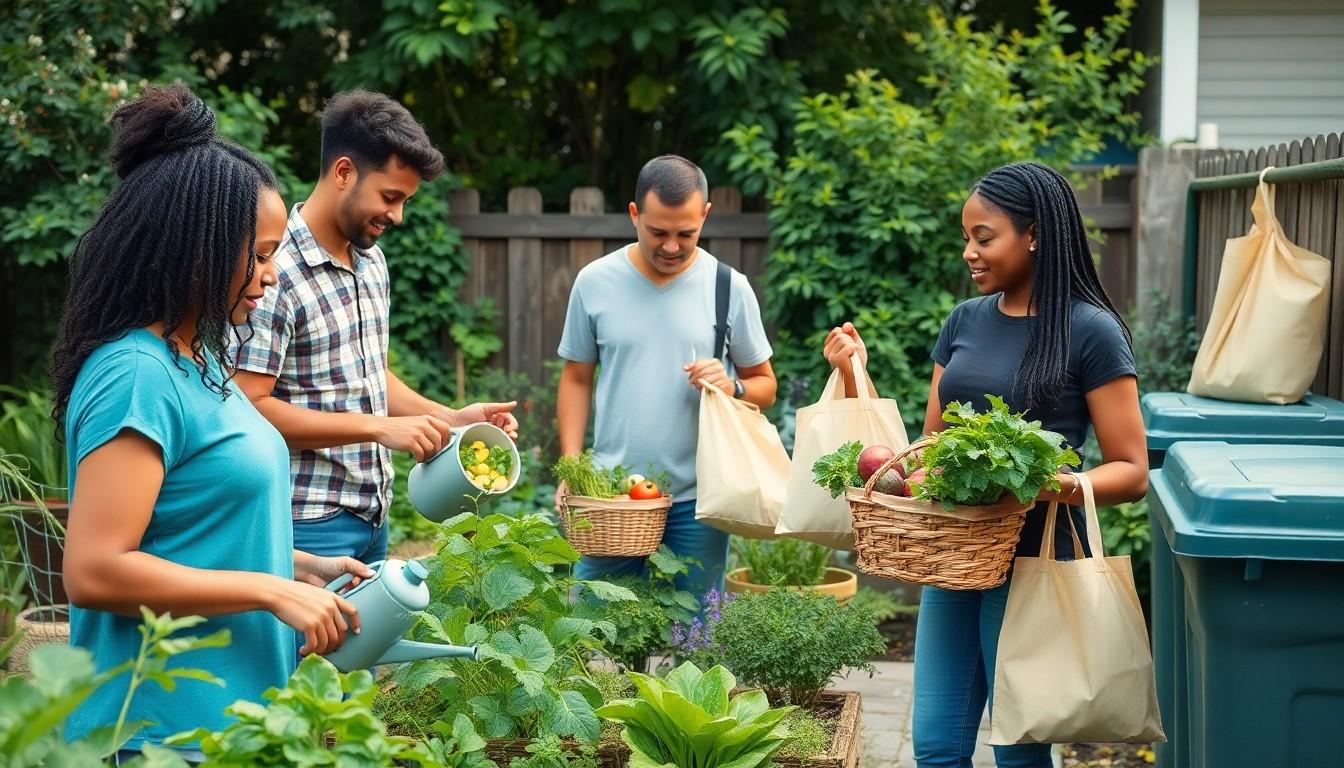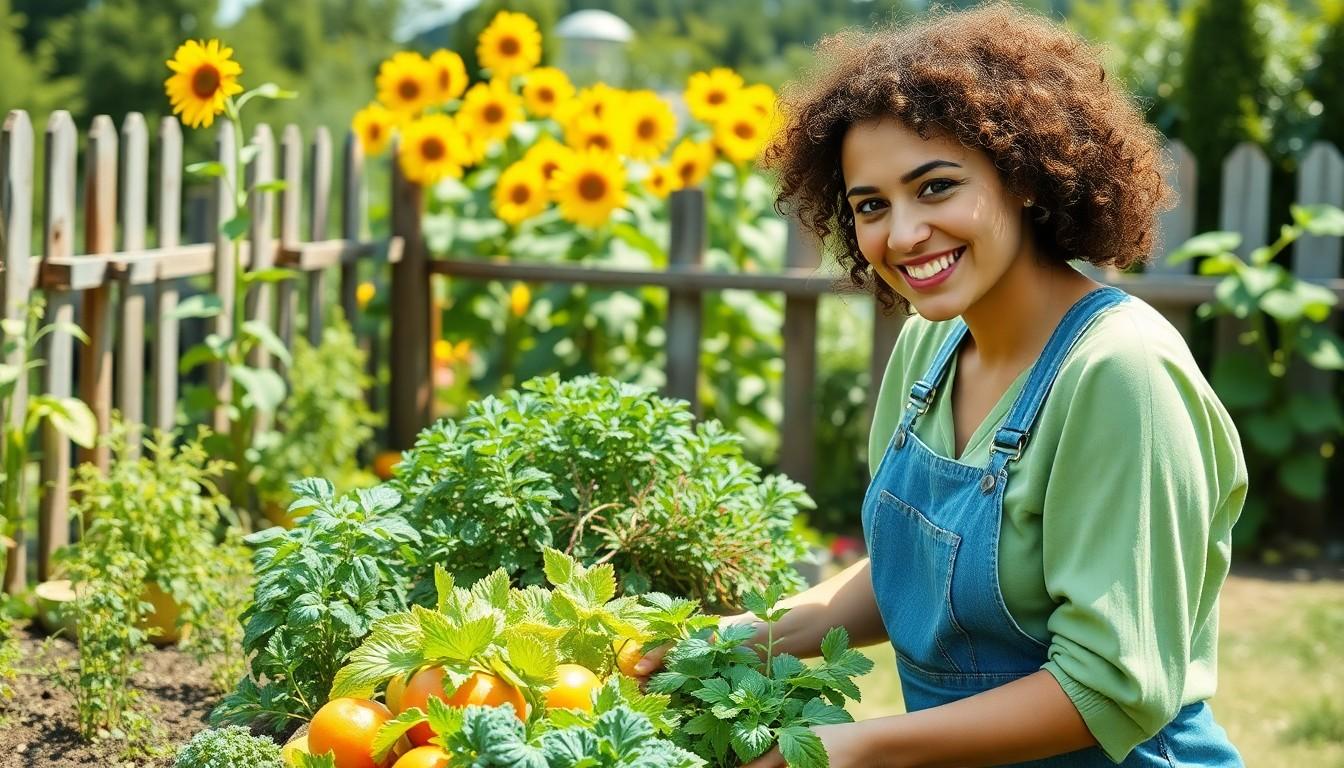In a world where convenience often trumps common sense, simple sustainable living might sound like a distant dream. But what if it could be as easy as swapping your morning coffee cup for a reusable one? It’s time to embrace a lifestyle that not only benefits the planet but also adds a dash of fun to daily routines. Who knew saving the Earth could come with a side of whimsy?
Imagine reducing waste while enjoying the satisfaction of a greener home. With small, manageable changes, anyone can embark on this eco-friendly journey. Whether it’s growing your own herbs or mastering the art of composting, sustainable living can be both simple and rewarding. So let’s dive into the delightful world of sustainable choices that’ll make Mother Nature proud—and maybe even earn a chuckle or two along the way.
Simple Sustainable Living
Simple sustainable living involves making mindful choices that enhance environmental health while fitting seamlessly into everyday life. These practices center on reducing waste, utilizing renewable resources, and embracing a lifestyle that respects the planet.
Definition and Concept
Simple sustainable living refers to adopting straightforward habits that reduce ecological footprints. It entails incorporating actions like using reusable bags, conserving energy, and minimizing single-use products. This approach encourages individuals to live intentionally, prioritize sustainability, and enjoy the benefits of a greener lifestyle. Engaging in practices such as local food sourcing or adopting minimalism aligns with this definition, promoting thoughtful consumption.
Importance of Sustainability
Sustainability plays a critical role in preserving natural resources and fostering a balanced ecosystem. Environmental degradation affects air and water quality, threatening human health. By prioritizing sustainability, individuals contribute to reducing pollution and conserving biodiversity. These efforts ensure future generations inherit a functional and vibrant planet. Moreover, choosing sustainable options often leads to cost savings, making it a practical choice as well as an ethical one. Embracing simple sustainable living enhances community resilience and promotes a healthier lifestyle for everyone.
Practical Tips for Simple Sustainable Living

Integrating sustainable habits into daily life is straightforward. Here are some practical tips to embrace simple sustainable living.
Reducing Waste
Focus on minimizing single-use items. Bring reusable bags when shopping and opt for a reusable water bottle. Compost food scraps instead of throwing them away, enriching the soil while reducing landfill waste. Choose products with minimal packaging to lessen environmental impact. Donate or recycle items you no longer need instead of discarding them. Adopt a mindset of purchasing only what’s necessary to curb excess consumption.
Energy Conservation
Conserve energy at home by switching to LED light bulbs, which use up to 80% less energy than traditional incandescent bulbs. Unplug electronics when not in use to prevent phantom energy consumption. Set the thermostat a few degrees lower in winter and higher in summer to save on heating and cooling costs. Utilize natural light during the day to reduce reliance on artificial lighting. Implement energy-efficient appliances, which can lower utility bills while minimizing energy consumption.
Sustainable Food Choices
Select locally sourced foods to reduce transportation emissions and support community farmers. Incorporate more plant-based meals into your diet for a lower environmental footprint. Grow herbs or vegetables at home to enjoy fresh produce while cutting down on grocery trips. Plan meals to avoid food waste and freeze leftovers for future use. Choose organic products when possible to promote sustainable farming practices that protect the environment.
Creating a Simple Sustainable Home
Creating a simple sustainable home involves integrating eco-friendly practices into design and daily living. Small adjustments can significantly impact environmental health.
Decluttering and Minimalism
Decluttering spaces promotes a simpler lifestyle that aligns with sustainability. Reducing excess belongings creates a more organized environment and minimizes waste. An individual can donate or recycle items that no longer serve a purpose, allowing others to benefit. Many find joy in less clutter, as it leads to increased mindfulness about what they possess. Focusing on quality over quantity ensures that each item chosen serves a functional or emotional need. This approach not only reduces consumption but also enhances mental clarity and well-being.
Eco-Friendly Materials
Using eco-friendly materials greatly contributes to a sustainable home. Opting for sustainable wood products, like bamboo or reclaimed timber, reduces the demand for new lumber. Choosing non-toxic paints and finishes improves indoor air quality and safety. Many manufacturers now offer flooring options made from natural fibers, like jute and cork, which have a lower environmental impact. Additionally, utilizing recycled materials in home construction or decor helps further decrease waste. Prioritizing energy-efficient appliances aids in conserving resources while lowering utility bills. Each decision made in selecting materials reinforces a commitment to sustainability and ecological health.

The Benefits of Simple Sustainable Living
Simple sustainable living contributes significantly to environmental health and personal well-being. Mindful choices create a positive ripple effect across various aspects of life.
Environmental Impact
Adopting eco-friendly habits directly reduces ecological footprints. Sustainable practices promote reductions in pollution, conserve biodiversity, and protect natural resources. Utilizing reusable bags and containers minimizes waste while supporting a circular economy. Composting food scraps enhances soil quality and decreases landfill contributions. Energy conservation through efficient appliances cuts down on energy usage, benefitting both the environment and households. Homegrown herbs or vegetables foster a connection with nature and lower carbon footprints. Choosing sustainably sourced products further ensures a commitment to responsible consumption and production. These actions collectively lead to a healthier planet for future generations.
Personal Wellbeing
Engaging in simple sustainable living boosts personal health and happiness. Decluttering promotes mental clarity, allowing individuals to focus on what truly matters. Using non-toxic materials enhances indoor air quality, reducing health risks. Plant-based meals not only nurture the environment but also improve physical well-being. Connecting with one’s community through local markets fosters relationships and a sense of belonging. Sustainable practices often lead to reduced expenses, enhancing financial peace of mind. Embracing these habits creates a balanced, fulfilling lifestyle enriched by purpose and joy.
Pave the Way for a Brighter Tomorrow
Simple sustainable living is an achievable goal that enriches both personal lives and the environment. By making mindful choices and embracing eco-friendly practices, individuals can create a positive impact without overwhelming their routines. These small yet significant changes foster a sense of community and promote a healthier lifestyle.
As people explore sustainable habits, they not only contribute to a greener planet but also enhance their well-being and mental clarity. The journey toward sustainability is not just about reducing waste; it’s about finding joy in simplicity and connection. Every effort counts, and each step taken brings us closer to a balanced and fulfilling existence. Embracing this lifestyle today paves the way for a brighter tomorrow.

